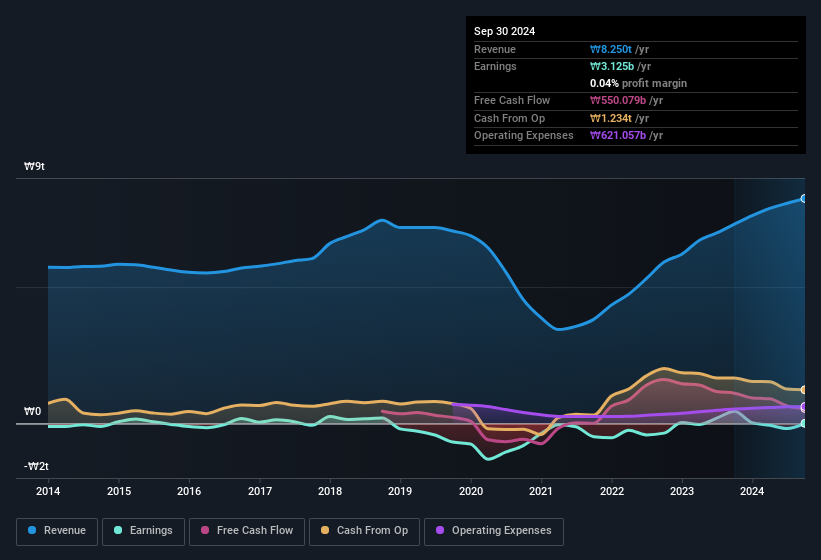- South Korea
- /
- Airlines
- /
- KOSE:A020560
Asiana Airlines' (KRX:020560) Soft Earnings Are Actually Better Than They Appear

Asiana Airlines, Inc.'s (KRX:020560) stock was strong despite it releasing a soft earnings report last week. We think that investors might be looking at some positive factors beyond the earnings numbers.
See our latest analysis for Asiana Airlines

A Closer Look At Asiana Airlines' Earnings
Many investors haven't heard of the accrual ratio from cashflow, but it is actually a useful measure of how well a company's profit is backed up by free cash flow (FCF) during a given period. The accrual ratio subtracts the FCF from the profit for a given period, and divides the result by the average operating assets of the company over that time. The ratio shows us how much a company's profit exceeds its FCF.
Therefore, it's actually considered a good thing when a company has a negative accrual ratio, but a bad thing if its accrual ratio is positive. That is not intended to imply we should worry about a positive accrual ratio, but it's worth noting where the accrual ratio is rather high. To quote a 2014 paper by Lewellen and Resutek, "firms with higher accruals tend to be less profitable in the future".
For the year to September 2024, Asiana Airlines had an accrual ratio of -0.47. That indicates that its free cash flow quite significantly exceeded its statutory profit. To wit, it produced free cash flow of ₩550b during the period, dwarfing its reported profit of ₩3.12b. Asiana Airlines' free cash flow actually declined over the last year, which is disappointing, like non-biodegradable balloons. However, as we will discuss below, we can see that the company's accrual ratio has been impacted by its tax situation.
That might leave you wondering what analysts are forecasting in terms of future profitability. Luckily, you can click here to see an interactive graph depicting future profitability, based on their estimates.
An Unusual Tax Situation
Moving on from the accrual ratio, we note that Asiana Airlines profited from a tax benefit which contributed ₩73b to profit. It's always a bit noteworthy when a company is paid by the tax man, rather than paying the tax man. The receipt of a tax benefit is obviously a good thing, on its own. However, our data indicates that tax benefits can temporarily boost statutory profit in the year it is booked, but subsequently profit may fall back. Assuming the tax benefit is not repeated every year, we could see its profitability drop noticeably, all else being equal. While we think it's good that the company has booked a tax benefit, it does mean that there's every chance the statutory profit will come in a lot higher than it would be if the income was adjusted for one-off factors.
Our Take On Asiana Airlines' Profit Performance
While Asiana Airlines' accrual ratio stands testament to its strong cashflow, and indicates good quality earnings, the fact that it received a tax benefit suggests that this year's profit may not be a great guide to its sustainable profit run-rate. Based on these factors, we think that Asiana Airlines' profits are a reasonably conservative guide to its underlying profitability. With this in mind, we wouldn't consider investing in a stock unless we had a thorough understanding of the risks. For instance, we've identified 2 warning signs for Asiana Airlines (1 is significant) you should be familiar with.
Our examination of Asiana Airlines has focussed on certain factors that can make its earnings look better than they are. But there is always more to discover if you are capable of focussing your mind on minutiae. Some people consider a high return on equity to be a good sign of a quality business. So you may wish to see this free collection of companies boasting high return on equity, or this list of stocks with high insider ownership.
New: Manage All Your Stock Portfolios in One Place
We've created the ultimate portfolio companion for stock investors, and it's free.
• Connect an unlimited number of Portfolios and see your total in one currency
• Be alerted to new Warning Signs or Risks via email or mobile
• Track the Fair Value of your stocks
Have feedback on this article? Concerned about the content? Get in touch with us directly. Alternatively, email editorial-team (at) simplywallst.com.
This article by Simply Wall St is general in nature. We provide commentary based on historical data and analyst forecasts only using an unbiased methodology and our articles are not intended to be financial advice. It does not constitute a recommendation to buy or sell any stock, and does not take account of your objectives, or your financial situation. We aim to bring you long-term focused analysis driven by fundamental data. Note that our analysis may not factor in the latest price-sensitive company announcements or qualitative material. Simply Wall St has no position in any stocks mentioned.
About KOSE:A020560
Asiana Airlines
Engages in air transportation business in South Korea and internationally.
Good value with adequate balance sheet.
Similar Companies
Market Insights
Community Narratives



